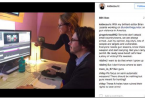Well, there’s no simple answer to this one. There are many types of licenses, with various degrees of scope dependent on use. If you’re pairing someone else’s music with your moving images (i.e. using someone’s recorded song in your movie), you would most likely need TWO licenses; a sync license, and a master recording license.
A sync (short for Synchronization, and pronounced “sink”) license gives you the right to use a song and to sync it with a visual. But here’s where it gets tricky. A sync license only allows you to re-record your OWN version of that song for use in your project. If you want to use a specific recorded version of a song recorded by a specific artist, you also need to get a master recording license from the one who owns the recording, most typically the record label.
A master recording license (also called a “master use” license) is essentially a license given to you by the record label or owner of the master allowing you to use a particular recording of a song in your movie.
Yeah, it’s confusing. Let’s look at some examples.
EX. 1: Say you want to add a 30 second clip of Jay-Z’s “99 Problems” playing in the background of a scene. You would first have to obtain a sync license from Jay-Z’s publisher, and then you would have to obtain a master recording license from Jay-Z’s record label.
EX. 2: One of your characters is singing Justin Bieber’s “Baby, Baby, Baby” in the shower. Since you’re not actually using a recording of Justin Bieber’s voice, only the song, you would only need a sync license. You would not need a master recording license, since you are not playing a recording.
Ex. 3: Music is a hobby of yours, and your garage band plays a mean cover of “Saturday Night Fever”, and you would like to use it in your film or make a music video. Well, technically, as a musician, you’re supposed to get a mechanical license from the publisher before recording someone else’s song, so make sure you do that. Then, to use your recorded version in your movie or video, you would need a sync license. Sometimes the terms of sync licenses are negotiated contemporaneously with the negotiations for a mechanical license if the band performing the cover has enough clout. But that’s another story for another day.
Ex. 4: You have no money. You want to include some sort of music in a scene. Now what? You can use one of the many royalty-free music options available (that usually cost a nominal fee), or you can use a song that is in the public domain, and have your actor sing it. “Amazing Grace” is a perfect example of a song in the public domain. Since it was written over two hundred years ago, the owner’s intellectual property rights have expired, and it is now available for public use without having to acquire a license (hence, in the “public domain”). So, no sync license needed, and since you’re not using a recording (your actor is singing it), no master recording license needed. (Here’s more songs in the public domain). I’ve also seen filmmakers scour band sites like myspace in search of original songs by unknown artists, and try to cut deals akin to a free license in exchange for free publicity for the band, usually with little success.
Ok, now that we’ve talked about what kind of licenses you may need and where to get them from (sync license [issued by publisher] and master recording license [issued by owner of the master recording, typically the record label]), let’s talk about money.
Sync License Fees
The fees for synchronization licenses vary with usage and the importance of the song. Obviously a full-length performance of a song in a summer blockbuster will garner a higher price than using a song for 20 seconds in the background underneath dialogue in a documentary. And yes, you need licenses for use in documentaries; it’s not fair use. An exception might be if your documentary is about the song itself, and even if in the clear, you’ll have an expensive defense on your hands without a license. License fees for use in commercials tends to be very high as well. Here’s a rough idea of some average numbers:
Major Motion Pictures = $20,000-$250,000+
Fees are towards the higher end if you’re seeking permission to use the song in trailers and advertising as well as in the film itself. If the song is used over the main title (opening credits), you’re most likely in the $75,000-$250,000 range. End title, $50,000 to $150,000.
Indie Films = Typically step deals ranging from $2,500 to $10,000
What’s a “step deal”, you say? It’s essentially a creative fee structure based on the success of your movie. For example, the publisher might request an initial payout of $5,000 for the license, and another $3,000 upon release to home video, or another $10,000 if the box office gross surpasses a pre-set dollar amount. If you don’t have an attorney negotiating for you, prepare to bend over. It won’t be pretty.
Master Recording License Fees
Now that you know how much you’ll be shelling out for a sync license, hopefully you’ll have some money left over for a master recording license. Master license fees are typically dependent on the popularity of the song. Obviously a billboard chart topper will cost more than an obscure band that no one ever heard of before. In addition, if you only use the song for 20 seconds as background filler, you will pay less than someone who features the song in a scene. But the master license fee typically hovers around the same amount as your sync license fee. So to be safe, prepare to double what you just shelled out.
As you can see, even if you wanted to properly license a song for your film, it’s extremely complicated. There are numerous rights to secure, requiring negotiations from several different parties, and no one makes it easy to figure out who you need to talk to about what. No one has devised a simple clearinghouse yet to handle all licensing issues. There are several “services” on the internet claiming they can get you licenses to use songs by major artists in your film for several hundred dollars. They even send you a nifty looking “certificate”. Um,…no. Nice try though.
Questions? Leave a comment below.





There are so many people on Youtube that I know do not do this. It makes me wonder how they get away with it, specially the ones who are more famous. I do have a question… When you want to use someone’s music from Youtube and they state that anyone can use it, do you need a contract then?
Question about using a cover song in an episode of a web series, because the information I’ve found online all contradicts itself: if I find a singer/band who covers a song, on say YouTube, and they already have the masters license to record a cover (and sync for their own video of course), does that mean I only need to negotiate for sync rights with the holder, and get the band to sign a contract with me for my series? Thanks in advance!